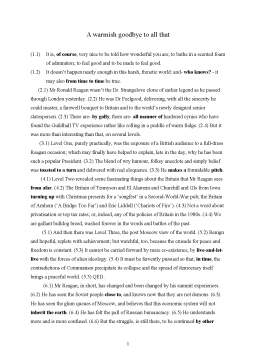Extras din referat
Now, that the text has been offered, we are going to try and analyse the fixed expressions that occur in the article. What has drawn our attention was Moon’s classification of the fixed expressions he traces in the text. Thus, they are divided into three categories, namely ‘metaphors’, ‘formulae’, ‘anomalous collocations’ and the categories of ‘proverb’ and ‘phrasal verb’.
Consequently, one of the fixed expressions submitted to analysis by Moon is ‘of course’, a “grammatically ill-formed” phrase or, to put it differently, an anomalous collocation. However, what drew our attention was the fact that the expression has been selected not only due to its “organizing properties”- since it may be used before an opinion or argument-, but also due to its quality of reinforcing the statement through emphasis. Just as the author observes, in an absolutely ordinary discourse, ‘of course’ serves as “a response to something previously said”, whereas here it stresses something, it therefore has an emphatic role.
Another fixed expression to be found in the text is ‘who knows?’. Just like the previous phrase, it functions as a modalizer and, what is more important, it expresses uncertainty, the author’s choice to refrain himself or herself from a firm statement. As Moon suggests, “it reinforces the epistemic modal ‘may’ in this text”.
‘From time to time’ is another grammatically ill-formed collocation to be found in the text, rather strange, however, if we are to consider it with regard to the frame of time. Within the context, the phrase indicates not repeated or recurrent actions, but frequency. Hence, it is “an epistemic modalizer”.
The phrase ‘by golly’ is normally used in interjections such as: “Golly!” meaning “Donnerwetter!”or“Menschenskind!” But within the given text it functions as “a modalizer by emphasizing”. Furthermore, we can notice that, in the article, the expression is placed in parentheses, which intensifies the amount of emphasis. The repetition of ‘there are’ (“There are- by golly, there are-“) intensifies the emphasis as well.
The anomalous collocation ‘all manner of’ serves as a quantifier, “with a following plural”, in this case ‘cynics’. Moreover, the expression is synonymous with ‘all kinds of’ and ‘all sorts of’, but it has a more derogatory meaning. Consequently, within the given context, it has “a subsidiary evaluative function”.
‘Toasted to a turn’ can be taken into consideration as a metaphor, although the expression ‘to a turn’ is anomalous as far as its relation to the noun ‘turn’ is concerned. What Moon suggests is the fact that “this particular instance can be considered an exploitation of the canonical form ‘done to a turn’, rather than a variation”.
Preview document
Conținut arhivă zip
- The Functions of Fixed Expressions in Texts.doc











